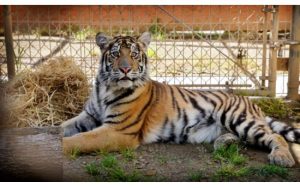San Andreas, CA — A nine-month-old tiger cub with a rare severe bone disease found a new home at the Performing Animal Welfare Society (PAWS) sanctuary in San Andreas on Monday.
Under the federal Big Cat Public Safety Act, passed in 2022 and championed by PAWS, it is now illegal for private individuals to own, breed, and sell tigers. The female tiger was confiscated this past February by the California Department of Fish and Wildlife and transported to the Oakland Zoo for initial treatment. Officials learned that as a result of inadequate nutrition, the tiger has a painful condition known as Metabolic Bone Disease that causes bones to be dangerously weak and sometimes break or even shatter.
PAWS Director of Veterinary Services, Dr. Jackie Gai, says, “While the tiger will never be completely normal, her overall condition has greatly improved under the care of Oakland Zoo, and we are cautiously optimistic that she will continue to improve in our care at PAWS. Many animals come to the sanctuary with a host of problems caused by the conditions of their captivity, and our staff have expertise in addressing their special medical and nutritional needs.”
At PAWS, the tiger will receive the specialized care and support she needs for the remainder of her life.
PAWS CEO Chris Draper adds, “We are very grateful to the California Department of Fish and Wildlife for taking swift action to save the life of this ailing tiger. We also thank the Oakland Zoo for their care and treatment of this special tiger, who we enthusiastically welcome to her permanent home at our sanctuary. She will have everything she needs to be comfortable and well cared for as she begins a new life at PAWS.”
PAWS notes that due to an ongoing legal case, it is unable to provide any specifics on the tiger’s origin or circumstances regarding her confiscation.
PAWS was founded in 1984 and provides lifetime care for captive wild animals and rescued or retired performing animals at its 2,300-acre sanctuary in San Andreas.

